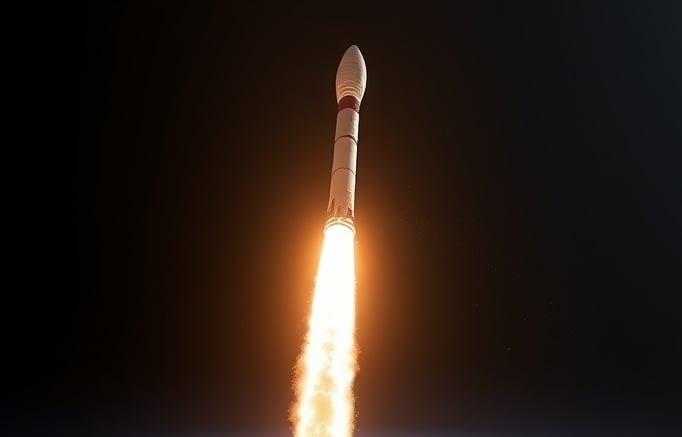Space Tech Explosion: How Private Companies Are Shaping the New Space Race
Uncover the exciting advancements in space technology, from reusable rockets to interplanetary exploration, led by private innovators like SpaceX and Blue Origin


The year is 2025, and the space race is no longer a battle between superpowers like the United States and the Soviet Union. Today, it’s a thrilling contest between private innovators, billionaires, and entrepreneurs who are making it possible for humanity to reach new frontiers in space like never before. From reusable rockets to plans for interplanetary travel, private companies like SpaceX, Blue Origin, and others are shaping the future of space exploration.
But what's driving this so-called Space Tech Explosion? And how are companies like Elon Musk’s SpaceX and Jeff Bezos' Blue Origin racing to conquer the cosmos? Let’s break it down in simple terms.
The Space Race 2.0: A New Frontier
You’ve probably heard about NASA and the traditional space agencies. They’ve been working on space exploration for decades, sending astronauts to the moon, developing the International Space Station (ISS), and sending probes to the furthest corners of the solar system. But now, a new kind of competition is heating up. Instead of governments, private companies are taking charge of the space race, and it’s opening up opportunities we once only dreamed of.
The Rise of Private Space Companies
The space industry has long been dominated by government organizations, with the U.S. leading the charge through NASA. However, the entry of private companies has revolutionized space travel in ways we could never have imagined.
Enter SpaceX, Blue Origin, and a host of other tech startups. These companies are driven by a single goal: make space travel more accessible. And the results have been nothing short of extraordinary. SpaceX has already reduced the cost of launching rockets and is working toward making interplanetary travel a reality. Blue Origin has dreams of building space hotels and human habitats beyond Earth. These aren’t just sci-fi fantasies anymore—they’re becoming real.
The Magic of Reusable Rockets: A Game-Changer
Before the advent of reusable rockets, space missions were expensive and wasteful. Every time a rocket launched, its components were left to burn up in the atmosphere or fall into the ocean. In other words, you could think of rockets as a one-time-use, super-expensive product.
SpaceX changed that. The company developed rockets that could return to Earth after a launch, land on a platform, and be reused for future missions. This has dramatically lowered the cost of launching payloads into space.
Reusability: The Key to Affordable Space Travel
Imagine buying a car and then just leaving it at the dealership after a single drive. That’s essentially what we were doing with space rockets before SpaceX came along. With reusable rockets, we’ve unlocked a new era where every launch doesn’t mean a fresh build. This brings costs down and opens up new possibilities.
As Elon Musk put it, “The key to making life multi-planetary is reducing the cost of getting to space. If we don’t have that, it’s just a pipe dream.”
SpaceX has proven this concept works, launching its Falcon 9 rockets multiple times, with several successful landings. The latest milestone? The Falcon Heavy—one of the most powerful rockets ever made—has completed several missions with reusable boosters.
Interplanetary Exploration: Mars, Here We Come!
The big dream of the 21st century? To become an interplanetary species. SpaceX is leading the charge with its Starship program, aiming to send humans to Mars by the mid-2020s. That’s right, folks—Elon Musk and his team are working on building a spacecraft that will not only ferry people to Mars but will also allow us to set up a colony there.
SpaceX has already made waves by sending astronauts to the ISS with their Crew Dragon capsules. But that’s just the beginning. If Musk has his way, he wants to make space travel routine—almost like booking a flight across the globe. The ultimate goal? Colonize Mars.
Mars: The Next Frontier for Humanity
While we’ve only just begun exploring Mars through rovers and unmanned spacecraft, the dream of sending humans to the Red Planet is getting closer every year. Thanks to companies like SpaceX, NASA’s partnership with private industry has made interplanetary exploration a real possibility.
As Musk famously said, “The Mars thing is the thing that gets me the most excited… we could create a self-sustaining city on Mars, and I think that would be an important milestone for humanity.”
The Space Economy: Space Tourism and Commercial Ventures
Space exploration isn’t just about rockets and Mars missions. There’s a booming space economy that's opening up new opportunities for commercial ventures.
Space tourism is one such example. Jeff Bezos’ Blue Origin and Richard Branson’s Virgin Galactic have made headlines with their plans to offer civilians a chance to experience space travel. These companies are bringing space travel to the masses, and as they perfect their technology, it could be as common as flying first class.
Space Tourism: A Flight to Remember
If you’re thinking, "I could never afford that," you’re not alone. But as the industry grows, the prices for space tourism could eventually become more affordable. It’s like how airplane travel used to be only for the rich. Nowadays, it’s pretty accessible. Who knows, in the future, you could book a ticket to orbit like you would to your favorite vacation spot.
Jeff Bezos summed it up perfectly when he said, “We are going to build a road to space so that our children and grandchildren can take that road and go to space."
How Private Companies Are Changing the Space Industry
What’s truly remarkable about these companies is how they’re transforming the traditional space industry. In the past, space exploration was an expensive and government-run endeavor. Now, private companies are creating competition and innovation that’s driving the industry forward faster than ever.
They’re not just reducing costs or improving technology—they’re rewriting the rules of space exploration, and in the process, they’re democratizing access to space.
The Future: Moon Bases and Beyond
While companies like SpaceX and Blue Origin are aiming for Mars, they’re also setting their sights on the Moon. NASA’s Artemis program aims to return humans to the lunar surface by 2024. But this time, private companies are going to play a major role in supporting the mission.
In fact, SpaceX is already contracted to deliver astronauts to the Moon using its Starship rocket. Imagine astronauts landing on the Moon once again, but this time with private companies taking the lead!
Conclusion: The Space Age Is Here
The Space Tech Explosion is a real, tangible thing. Private companies like SpaceX and Blue Origin are changing the way we think about space. They’re making space travel more affordable, more reliable, and more exciting than ever before. In the coming years, we’ll see more missions to the Moon, Mars, and beyond. And perhaps one day, traveling to space won’t just be a dream—it’ll be part of our everyday lives.
As Musk says, “I think we’re going to be able to do amazing things over the next few decades. I think the future is going to be incredible, and the only way to make it happen is to keep trying.”
So, buckle up. The Space Race 2.0 is well underway, and it’s looking like one wild ride!






